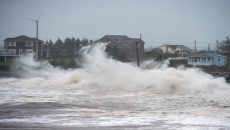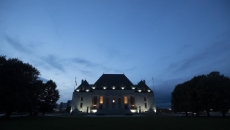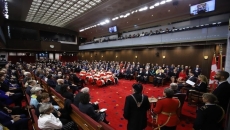Offenders in Nunavut should not necessarily get shorter jail time because of the COVID-19 pandemic, says Nunavut’s top judge.
Chief Justice Neil Sharkey says while the pandemic should be taken into account when determining a fit sentence, it should not automatically reduce it.
"I am of the view an informed and sympathetic public does not support the blanket proposition that all jail sentences during the time of COVID-19 should be reduced because of restrictive prison conditions and/or the increased risk of infection of the offender," Sharkey wrote in a decision released last week.
Nunavut has not had any of its own cases of COVID-19, although three have been brought in by mine workers from outside the territory.
Sharkey also said people in custody waiting for a court appearance during the pandemic should not receive additional credit because the Criminal Code doesn't allow it.
"I have no jurisdiction to allow additional or enhanced remand credit during COVID-19 beyond that already allowed by the Criminal Code. Only a successful constitutional challenge to the current limitation would allow for additional enhanced remand credit."
The Criminal Code says judges can deduct up to 1 1/2 days from an offender's sentence for each day served in remand.
Sharkey did urge sentencing judges in Nunavut to take COVID-19 into account when fixing a sentence.
He said he believes there is public support for the idea that if an offender “has already been punished by an increased risk of exposure to the virus,” then time spent on remand should be a sufficient penalty.
“This is not just the decent and humane thing to do, it also speaks to public health concerns – one less person in remand translated to less risk to the community,” Sharkey wrote.
He suggested an offender would be “getting a discount,” but at the same time, would already have been punished.
“They have already suffered the psychological stress associated with a risk of infection … to a greater degree than the rest of society.”
The approach wouldn't be appropriate in a case where a lengthy penitentiary sentence would be appropriate, Sharkey noted.
At the centre of Sharkey’s decision is the case of Gordon Pangon, 27, who pleaded guilty to assaulting his spouse and to breaching his bail terms.
Sharkey sentenced the man from Cambridge Bay, Nunavut, to 180 days in the Rankin Inlet Healing Facility, a 48-bed, low- and medium-security jail. Sharkey gave Pangon 1 1/2 times credit for the 66 days he had spent in remand, leaving him with 80 days to serve.
Pangon spent 14 days in isolation when he was first put into custody, as required by COVID-19 prevention measures. He was given a short amount of time each day to shower and use the telephone, but was not allowed to socialize with other inmates and could not take part in rehabilitative programming.
Nunavut's jails had also suspended all outside visits and were closed to the public as part of pandemic precautions.
Pangon's lawyer had requested that his client receive an additional 1 1/2 days in credit for the two weeks he spent in isolation.
Sharkey denied the request.
"I do not favour deducting a specific amount of time from an otherwise fit and proper sentence simply because of restrictive conditions which may be in place on the day the offender is sentenced," Sharkey wrote.
All restrictions brought in earlier during the pandemic at Nunavut's correctional facilities were lifted in June.






